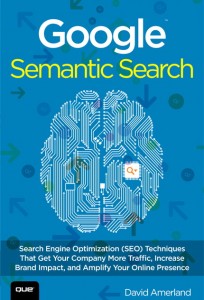The world of SEO has been a ceaseless moving beast over the last few years, so much so it has prompted many shifts and changes within the tactics websites need to use in order to gain that all-important visibility. Behind a lot of these changes (aside from Google’s aggressive anti-webspam policies) is a shift to a new way of searching for the user, a more intelligent search based beyond just the keyword - and that is semantic Search.
In his recently released book “Google Semantic Search” David Amerland charts the rise of semantic search and more importantly lends his insight into what is needed to make use of this move away from keyword search towards the semantic web. David kindly agreed to answer some of my questions around his book and the semantic web in general, here’s what happened.
Very briefly, for those who haven’t read your book yet, can you describe semantic search?
In its simplest form semantic search understands the search query and its intent, much like a person would, and then returns the best answer that matches it. This impacts everything: how we use search as users, how we create content as webmasters and marketers and how search indexes it.We are a long way from having a perfect search but the process has started.
Within the move towards semantic search, which are the most important signals marketers need to focus on?
The value of the content that is created and how that is shared across the social web.
How does Google’s recent Hummingbird update fit into this future of semantic search?
Hummingbird created a smarter search. It has the capability to better understand the words entered in the search box and therefore work out the intent behind them and it has the ability to also better understand the content in Google’s index and serve up better results.
In a digital world which looks to award quality, creativity and meaningful interactions, what do you think are the main changes which need to be made?
A return to basics. We have forgotten how to be “us” because we have had tools that allowed us to easily see what everyone else is doing. In the process we’ve all drifted towards a middle ground of uninspiring mediocrity. We need to stop thinking of our competitors first and start thinking of what it is we do and why we do it, first.
You mention in your book the idea that there may no longer be the “first page” within Google - what, do you think are the biggest changes this will make to businesses and marketers alike?
If we stop chasing a ranking in a leaderboard that was good for the ego we will start to focus on creating the all-necessary value that our online visitors demand. That requires a complete mindshift for everyone working online.
In your book you set the new rules for SEO and a notable absence from the list was link building - for many this is synonymous with SEO, how can we challenge this approach and move people away from the reliance on built links?
Links are still important but their nature has changed. Our focus on them in the past laid down the practices that led us to poor content, poor user interface and poor user experience. We need to start getting back up on these first and then organic links will follow.
Finally, Google+ - if anyone already follows you on there they will know what you’re thoughts on this are, but for everyone else, what makes G+ the social network for the future?
Everything that happens on G+ is recorded, analyzed and categorized by Google. If there is one shortcut that is still available to online businesses in the semantic web age it’s that. By allowing Google to better understand who you are and what you do and what your interests are you are speeding up the process that will help you define your unique digital identity.
- Quality, meaningful interactions are king.
- Back to basics, do it right first
- It’s not just about rankings any more, it’s about bringing value to your users first.
- G+ is the future - get on it before anyone else!
Thanks for David’s time in answering the questions!
What do you think the future of semantic web holds for us? Have you started seeing the effects of semantic search? Are you looking to up your game to make sure you’re not left behind? Let us know in the comments below, or get in touch!











